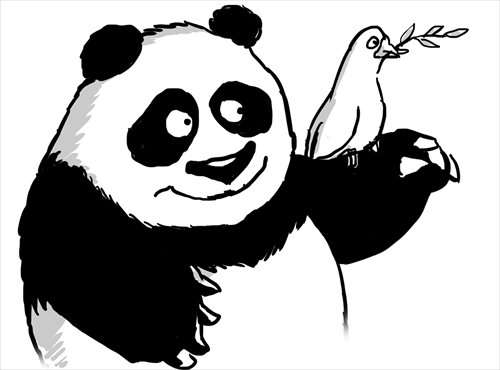Impartial China can help Afghan mediation

Illustration: Liu Rui/GT
Recently, the news that the Afghan Taliban sent a delegation on a trip to Beijing and were hosted by Chinese authorities in November 2014 has been heavily hyped by overseas media. They are, however, needlessly making a fuss. But it is quite normal that the rest of the world has been following closely the situation in Afghanistan and the development of Sino-Afghan relations that boast special features.
Afghanistan is an important neighbor of China and the two countries have been developing friendly ties for many years. Nonetheless, the flames of war blazing across Afghanistan over the past decades have not only severely threatened the lives of the Afghan people, but also directly impacted the stability and prosperity of China's northwestern border area. Beijing is quite concerned with the situation in Afghanistan and sincerely hopes it will be able to achieve peace and reconciliation and embark on a road of prosperity and development.
Afghanistan has been torn apart by war over the past several decades. From the Soviet's war in Afghanistan that lasted from 1979 to 1989 to the anti-terror war launched by NATO starting from 2001, the once peaceful and bountiful nation has become one of the most insecure and fragile countries in the world. The Afghan people love peace and yearn for development, but the special geopolitical environment and the complicated history have turned their country into the arena of great powers. Since the 9/11 attacks, it has become a main battlefield of the Western-led War on Terror.
NATO has withdrawn from Afghanistan and formally ended its combat operations in Afghanistan in 2014, which, however, could hardly mitigate the country's political crisis and economic recession. NATO has left an awful shambles in Afghanistan, which is now in urgent need of recovery and reconstruction.
The issue of Afghanistan is complicated because great powers, political and religious forces from peripheral countries and various political factions and tribes within the country have all involved themselves in this arena.
The current Afghan regime was established after the US-led NATO coalition toppled the Taliban. Whether or not it is a legally elected government in accordance with modern democratic principles and has been acknowledged worldwide, apparently the Afghan opposition forces are built on a profound historic and realistic basis. As a major opposition group, the Taliban have seen rapid development in recent years, faithfully mirroring the complexity of Afghanistan's political ecology.
This means the Afghan regime and the Taliban possess an almost equal voice in the reconstruction of state power. Consequently, counting on external forces to help mediate seems indispensable. Nonetheless, the prolonged conflict tormenting Afghanistan has made it hard to find a mediator who adopts a fair and just stance and can be trusted by all sides.
As the West helped set up the Afghan regime and stood against the opposition forces in the first place, it is not able to untie the knot of domestic conflicts in Afghanistan. Undoubtedly, China is the optimal mediator in the mess of this war-stricken nation. China did not get involved in the war in Afghanistan. It is committed to supporting related parties in addressing both the historical and present contradictions of Afghanistan and leading the country to a peaceful reconciliation and enduring prosperity.
However, China can only play a limited role as a mediator given its current diplomatic resources, experience of conciliation in international crisis and influence upon the rest of the world. Therefore, Beijing will try its best to provide a platform for the parties concerned to discuss issues surrounding Afghanistan's peaceful reconstruction.
China's willingness to promote the reconciliation and reconstruction process in Afghanistan will not necessarily lead to a quick settlement of the intractable conflict. The final solution lies in the position of various parties involved and the process is bound to be full of twists and turns.
The author is an associate research fellow of the Institute of Russian, Eastern European, Central Asian Studies at the Chinese Academy of Social Sciences. opinion@globaltimes.com.cn